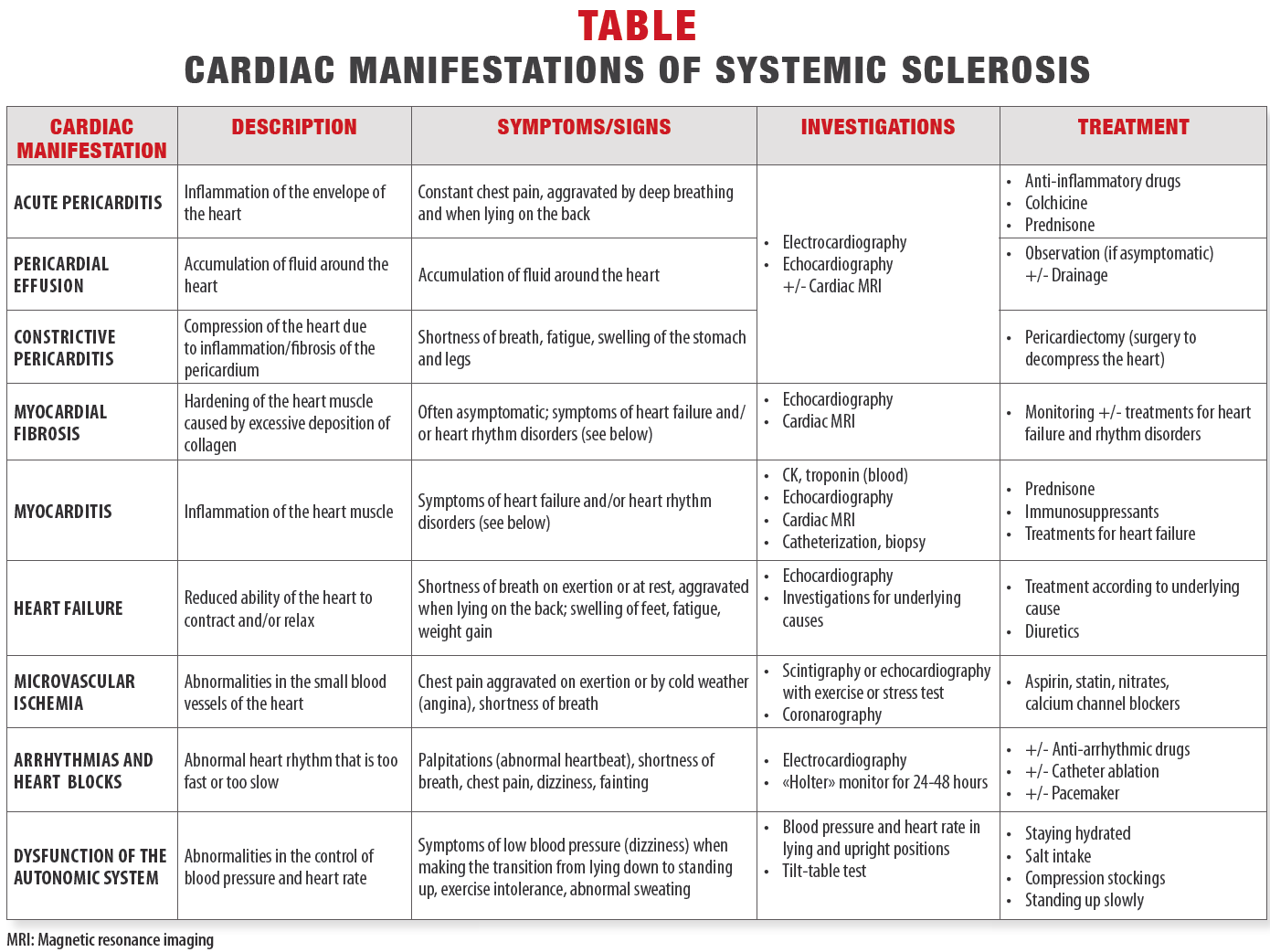Cardiac Involvment in Systemic Sclerosis

Systemic sclerosis (or systemic scleroderma) is a disease characterized by abnormalities in the functioning of small blood vessels and of the immune system, ultimately leading to inflammation and excessive fibrosis of the skin and various organs, including the heart.
WHO IS AT RISK OF DEVELOPING CARDIAC INVOLVEMENT?
Cardiac involvement occurs in 10 to 30% of patients with systemic sclerosis. Cardiac involvement occurs in both the limited and diffuse forms of the disease, but is generally more frequent and severe in patients with diffuse disease with rapidly progressing skin involvement and in those with associated myositis (inflammation of the muscles).
WHAT ARE THE SYMPTOMS OF CARDIAC INVOLVEMENT?
Symptoms indicative of cardiac involvement include:
- unusual shortness of breath or fatigue (tiredness) during physical exertion;
- shortness of breath at rest;
- shortness of breath when lying down;
- awakening during the night due to shortness of breath;
- painless swelling of the feet and legs (edema);
- chest pain that increases with physical exertion (angina);
- chest pain aggravated by inspiration (breathing in) and when lying down;
- palpitations or feeling that the heartbeat is irregular or abnormal;
- dizziness or fainting;
- generalized fatigue (tiredness).
It should be pointed out that a number of very different heart problems can cause identical symptoms. Therefore, the doctor will proceed to a more in-depth evaluation in order to determine the underlying cause of these symptoms and decide on the most appropriate course of treatment.
WHAT ARE THE CARDIAC MANIFESTATIONS OF SYSTEMIC SCLEROSIS?
Patients with systemic sclerosis can have cardiac problems that are directly caused by systemic sclerosis (small vessel abnormalities, inflammation, fibrosis), but can also have heart diseases commonly found in the general population around the age of 50, which is also the typical age at onset of systemic sclerosis (e.g., atherosclerotic coronary artery disease, valve problems, heart problems related to high blood pressure or “hypertension”, etc.).
CARDIAC INVOLVEMENT ASSOCIATED WITH SYSTEMIC SCLEROSIS CAN BE CLASSIFIED ACCORDING TO THE AFFECTED COMPONENT OF THE HEART (SEE TABLE FOR DETAILS):
Diseases of the pericardium (envelope of the heart):
- acute pericarditis: inflammation of the pericardium;
- pericardial effusion: accumulation of fluid around the heart; may be related to kidney damage or pulmonary arterial hypertension (high pressure in the arteries of the lungs;
- constrictive pericarditis: compression of the heart due to prolonged inflammation and excessive fibrosis of the pericardium (rare).
Diseases of the myocardium (heart muscle):
- myocardial fibrosis: hardening of the heart muscle caused by excessive collagen deposition;
- myocarditis (acute or chronic): inflammation of the heart muscle; may be associated with inflammatory muscle disease (myositis);
- heart failure: reduced ability of the heart to function; may be caused by myocardial fibrosis, acute or chronic myocarditis, high blood pressure (measured at the upper arm with a blood pressure monitor), pulmonary arterial hypertension, vascular disease or other causes.
Vascular diseases (vessels in the heart)
- microvascular ischemia: abnormalities of small blood vessels that constrict (narrow) spasmodically (as in Raynaud’s phenomenon), leading to a decrease in oxygen supply to the tissues of the heart, which over time may lead to myocardial fibrosis.
Heart rhythm disorders (electrical system in the heart)
- arrhythmias and heart blocks: abnormal heart rhythm that is too fast or too slow, due to a disruption in the flow of electrical current through the different parts of the heart; can be caused by myocardial fibrosis, myocarditis, pulmonary arterial hypertension or other causes;
- dysfunction of the autonomic system: abnormal control of blood pressure and heart rate; may be an early sign of myocardial fibrosis.
HOW TO SCREEN FOR CARDIAC INVOLVEMENT IN SYSTEMIC SCLEROSIS?
Given the sometimes silent progression of the various cardiac abnormalities, it is important to perform a targeted cardiac assessment approximately once a year. This involves a questionnaire and physical examination, as well as certain screening tests such as an electrocardiogram (or EKG, measures the passage of electrical current through the heart) and an echocardiogram. Further tests are sometimes necessary depending on the symptoms reported (stress tests, cardiac magnetic resonance, Holter, cardiac catheterization). Once detected, cardiac problems associated with systemic sclerosis usually require a consultation and concomitant follow-up with a cardiologist.








